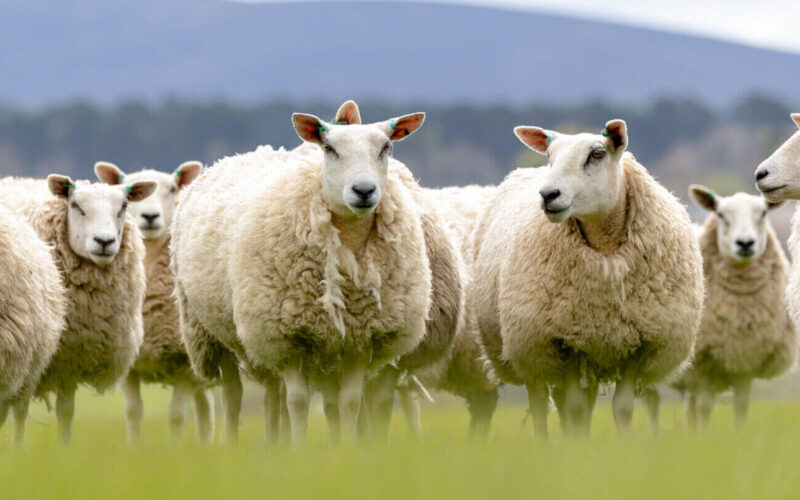This section focuses on sheep dip but pour-ons and injectables can also be effective treatments to control sheep ecto-parasites. Prior to treating, farmers should discuss appropriate methods of treatment for their livestock with their vet, as there may be other suitable options
Chemicals used in sheep dip and pour-on treatments are toxic to the water environment. Sheep dip is defined as:
For the treatment of parasites: liquids, containing chemicals which are authorised and marketed as veterinary medicines for the treatment of sheep ectoparasites, into which sheep are immersed and/or in which sheep are showered.
For cosmetic reasons: liquids, containing phenols, phenolic compounds and hydrocarbons which are authorised and marketed as cosmetic products for sheep, into which sheep are immersed and/or in which sheep are showered.[1]
Sheep dipping can play an important role in the maintenance of good animal welfare. The chemicals used in dips are highly toxic and, if used properly, are very effective against parasites that colonise sheep skins and fleeces. However, if good practice is not followed, this can have devastating consequences for the water environment. Ground and surface water can also be put at risk if dipping-related activities are not managed properly. The Water Environment (Controlled Activities) (Scotland) Regulations 2011 have been amended to ensure that certain substances either do not enter, or do not cause pollution of, the water environment. Refer to GBRs 24.
The improper use and disposal of dip poses significant risk of contaminating drinking water supplies taken from groundwater (e.g. springs, wells or boreholes). Groundwater and surface water are interlinked, therefore, pollution of one can seriously affect the quality of the other.
Those dipping sheep must hold or be under supervision of a holder of a ‘Certificate of Competence in the Safe Use of Sheep Dip’. Dip must be purchased by a certificate holder.
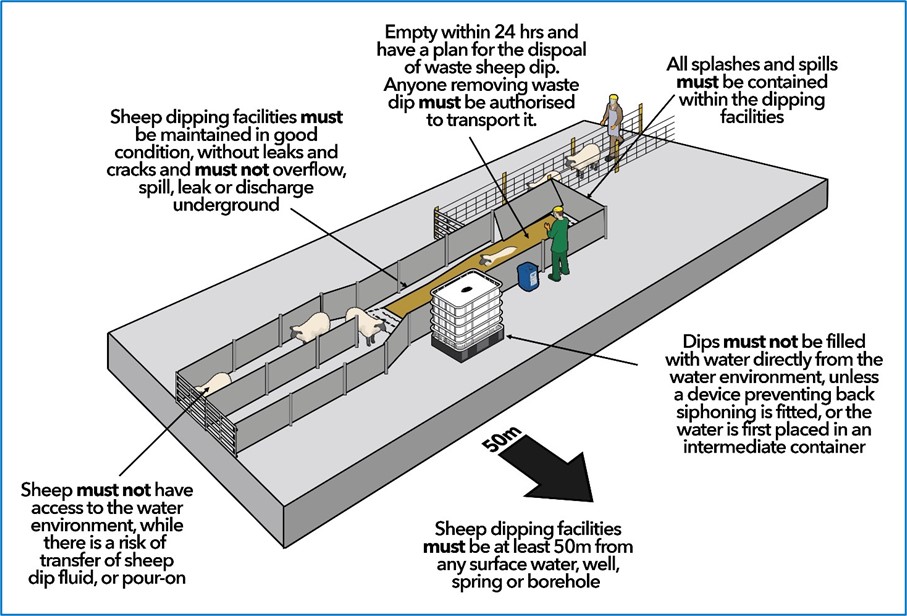
Figure 1 – Example of sheep dipping and handling facilities from Know the Rules Factsheet 13
If a spillage or incident occurs SEPA should be contacted immediately via SEPA’s 24-hour Emergency Hotline number 0800 80 70 60.
[1] https://www.farmingandwaterscotland.org/wp-content/uploads/2022/11/KTR13Sheepdipping.pdf
A summary of required dipping actions is below, modified from SEPA’s Sheep Dipping Code of Practice for Farmers, Crofters and Contractors.
Pre-dipping
- Carry out a Health and Safety risk assessment and produce a list of Emergency contacts, which should be available at the sheep dip store and made available to all contractors. All staff must have read and agree to comply with the HSE Advice for farmers and others involved in dipping sheep requirements.
- Make a record of all dip treatments being used.
- Ensure all staff are fully trained in the correct use of dips and the process. A certificate of Competence must be held by the person dipping, or supervising dipping. This person must be present during the dipping process.
- Ensure dip bath is maintained with no signs of wear and tear or cracking.
- Ensure that the bath is watertight; trial a full bath filled with water for at least 24 hours to ensure no leaks.
- Put a contingency measure in place, in case of spillage, to ensure that in the outcome of a spillage it can be controlled and no runoff results.
- Obtain a licence from SEPA or confirm an alternative disposal route with a waste contractor to plan your disposal of the waste dip.
- Do not transport the dip concentrate in unauthorised container.
- Ensure that dip concentrate containers are appropriately marked and all staff are aware of their location. Ensure the material is stored securely and cannot be accessed by unauthorised personnel.
- Be wary of weather conditions and do not dip when heavy/prolonged periods of rain are forecast.
- Do not located dipper sites within 50 m of watercourses or water supplies
- Fill the dipper with water first before adding the dip concentrate.
- Measure and mix the dip within the dipping facility so any spills or drips will be washed into the dipper.
- You must not use water from the water environment for filling sheep dipping facilities unless a device has been fitted to prevent back siphoning, or the water is place initially into an intermediate container.
- Ensure that you check the forecast to avoid rain during or soon after dipping.
During dipping
- Those dipping sheep must hold or be under supervision of a holder of a Certificate of Competence in the Safe Use of Sheep Dip.
- Try to ensure that splashing is kept to a minimum. Splash protection should be used during dipping to ensure all dip in contained within the dipping area.
- Make sure that drips pens and silt traps are functioning, preventing leakage/overflow, ensuring operator safety at all times.
- Return clean empty concentrate containers to supplier, or crush, puncture or flatten containers to ensure that they are not reused.
- Ensure that you monitor weather conditions throughout to ensure that you are not dipping during rain or if rain is forecast within 24 hrs of dipping.
- Monitor dip bath levels throughout to prevent overflow. You must not let the bath overflow.
- All staff must wear appropriate Personal Protective clothing while working within the dipping operations.
- Ensure that all containers are stored at the dipper; take care that these are not damaged or knocked over.
- All containers must be rinsed out three times with clean water and contents disposed of into dip bath.
Post dipping
- Do not burn dip concentrate containers. Ensure you follow your pre planned authorised method of disposal, via a licensed contractor or a local authority waste collection service.
- Sheep must remain in a drip pen for a minimum of 10 minutes after they have been dipped. Good practice would be to then hold them within a grassed paddock or holding area, away from waterbodies/water supplies for 24 hours. Please ensure that these actions comply with the label on the chemical instructions.
- You must comply with Licences issues by SEPA with regard to the disposal of waste sheep dip.
- You must dilute the waste dip. A minimum of 1 part waste dip solution to 3-part water and/or slurry as soon as possible. If detoxification is being undertaken such dilution should be carried out after detoxification.
- Waste sheep dip needs to be securely contained for transit to ensure the chance of spillage remains low.
- The areas where dipping occur must be washed down and the dipper needs to be emptied as soon as practically possible after the sheep have been treated, however, this needs to be completed within 24 hours.
- The waste sheep dip should be disposed of as soon as possible to minimise the risk of pollution.
- Ensure that newly dipped sheep are not in contact with waterbodies, water supplies for two weeks after dipping.
- Do not leave the dip areas unattended during cleaning when water hoses are on.
- You must not use soakaways for the disposal of waste sheep dip.
- You must not dispose of waste sheep dip into slurry storage.
- If waste sheep dip is to be moved off farm ensure that the contractor is a licensed waste carrier.
- All movements of waste sheep dip off farm must be recorded on a Waste Transfer Note and be available for inspection.
- You must dispose of waste sheep dip as soon as possible.
If a spillage or incident occurs SEPA should be contacted immediately via SEPA’s 24-hour Emergency Hotline number 0800 80 70 60.
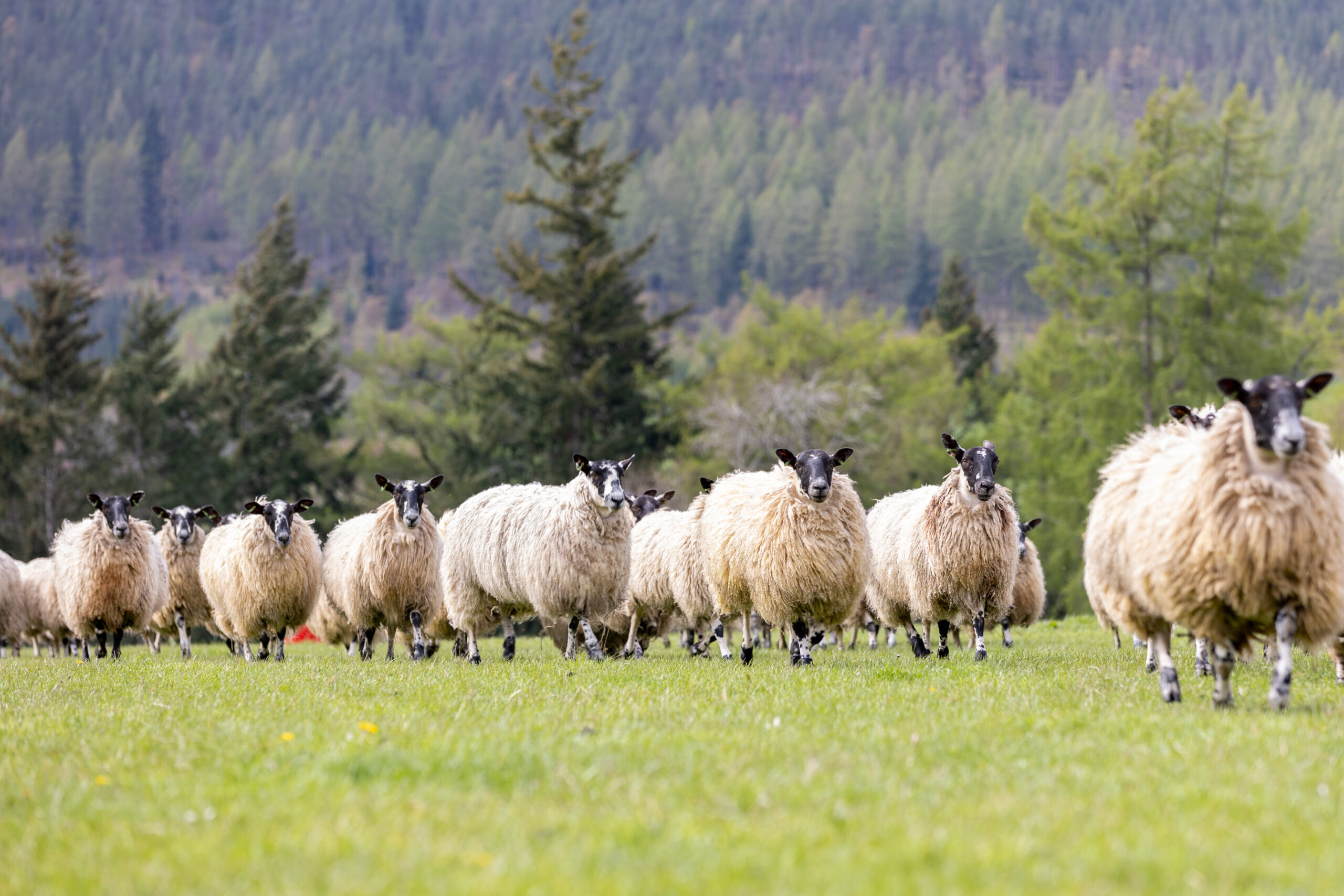
Copyright: Melissa Irvine Photography
Please note that dip must only be applied through plunge dip. It Is illegal to apply via a jetter or shower.
The Mobile Sheep Dipping Code of Practice was updated in August 2023 for Farmers, Mobile Dipping Contractors and Prescribers, the update can be found here.
Mobile dipping systems should be sited in accordance with the SEPA Dipping Code of Practice and follow the following guidance:
- 50 m from watercourses and wetlands
- 50 m from any well, spring or borehole
- At least 50 m away from any ditch, burn, river, loch, wetland, coastal water, well, spring of borehole.
Please refer to GBR 24.
Table 8.2 provides a summary of actions pre and post dipping (modified from the Sustainable Control of Parasites Code of Practice for mobile dippers).
Table 8.2 Actions pre and post mobile dipping
| Pre Mobile-Dipping | Post Mobile Dipping |
| A certificate of Competence must be held by the person dipping, or supervising dipping. This person must be present during the dipping process. | Do not handle sheep after dipping without appropriate PPE for 3 months. |
| All staff must have read and agree to comply with the HSE Advice for farmers and others involved in dipping sheep requirements. | Do not use levamisole anthelmintic for 14 days prior and post dipping. |
| The person responsible for dipping must have read and comply with SEPA’s Dipping Code of Practice. | Avoid shearing sheep for three months post dipping. |
| Site of treatment area must be carefully selected, including area for sheep to move onto. The areas need to be fully contained and prevent polluting entering groundwater or watercourses. | Sheep are required to dry entirely, this can take 2 -4 days. |
| Sheep require to have at least 1 cm of fleece growth prior to being dipped. | Registered waste carriers must comply with all waste duty of care requirements. |
| Sheep need to be dry at time of dipping. | Records must be kept for five years of all waste removed by a licenced waste contractor. |
| Observe weather conditions, sheep dipping should be carried out in cool and dry conditions. Avoid dripping in temperatures around or below freezing. | Ensure that all records are updated and recorded by Prescriber and Contractor. |
| Have an agreement in writing stating who will take responsibility for the safe disposal of the used dip. |
If a spillage or incident occurs SEPA should be contacted immediately via SEPA’s 24-hour Emergency Hotline number 0800 80 70 60.
If a spill occurs try to contain the spillage, never try to wash it away unless the run-off can be collected within the dip bath. Spills of concentrate can be soaked up using sand, sawdust or other absorbent materials.
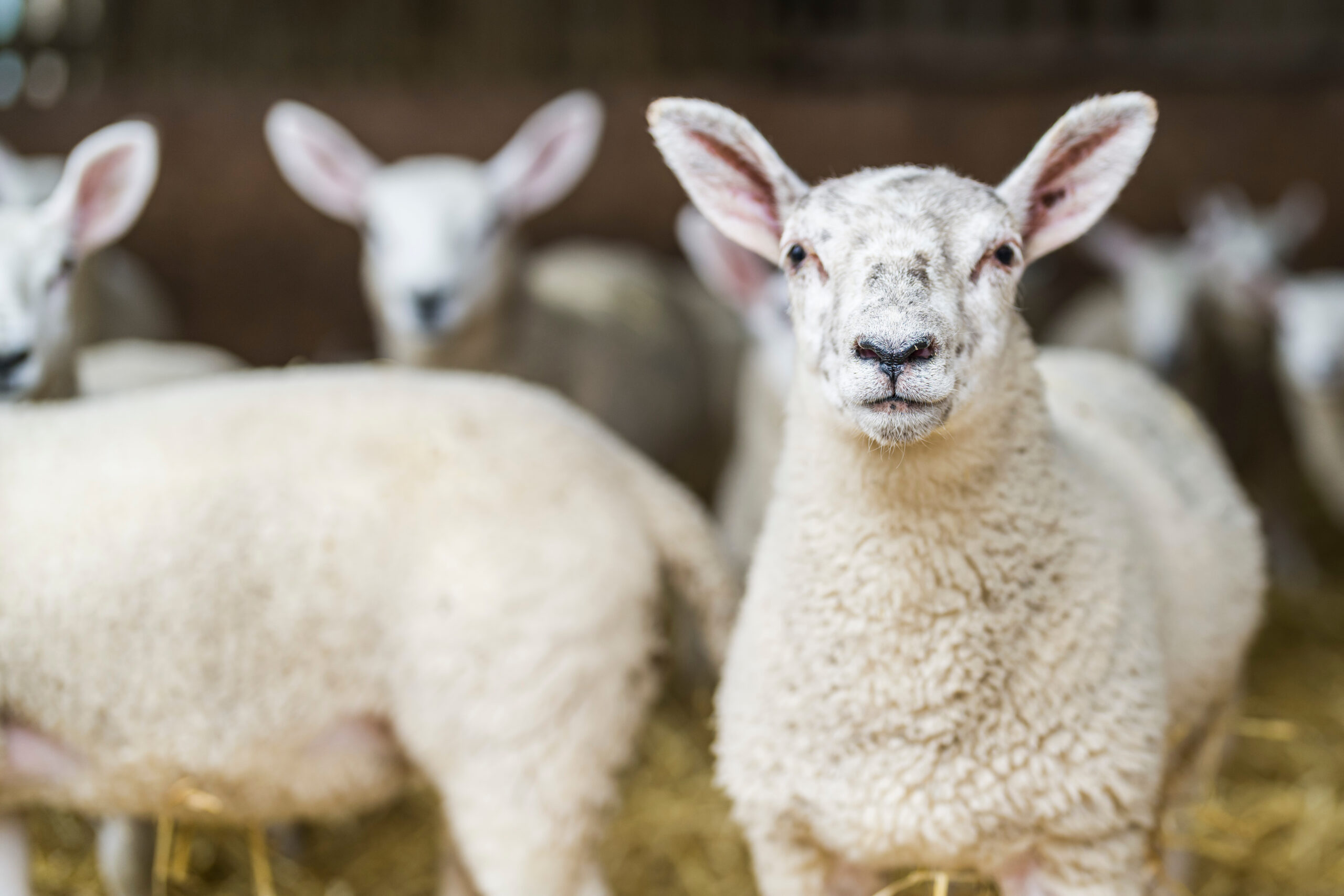
Sheep in the Uplands at Ballindalloch Home Farm
Copyright Craig Stephen
Holding sheep
When sheep have been dipped they still pose a risk of contamination. To minimise this risk sheep should be held in a holding area/grass paddock away from watercourses for a minimum of 24 hours. The longer they are held the better. The holding area should:
- Be 50 m away from surface water.
- Be 50 m away from wells and springs.
- Have a drinking trough.
This could be a grass paddock or bedded court. When sheep are returned to the field surface water, wells/springs and frozen/hard ground should be avoided to reduce contamination risk.
If the sheep are being transported, the trailer must be supplied with sufficient bedding to absorb any excess dip from the sheep.
Emptying the dip bath
- When dipping has been completed the dip pen, all equipment used and clothing needs to be washed down into the bath. This needs to be emptied within 24 hours.
- The bath needs to remain covered to prevent rainwater entering the bath and to avoid animals or people falling into the bath.
- If the waste dip cannot be disposed of immediately it must be stored in secure, leak proof containers away from surface waters, wells and springs.
- If you do not have the facilities to ensure that rainwater cannot be prevented entering the dip bath, ensure that over spill will not occur
Even a small amount of dip left within the bath can have a significant detrimental effect to surface and ground water if it is washed out.
Disposal of waste dip and containers
Authorisation is required from SEPA for the disposal to land of waste sheep dip, including those used as a treatment for ectoparasites or cosmetic formulation in sheep. Where waste sheep dip is disposed of to land, you must hold a licence under the Controlled Activities Regulations (issued by SEPA) and must adhere to the conditions contained within the licence.
Alternatively, the waste dip can be securely stored until collected and disposed of by a licensed waste disposal contractor. If a Purl dip is used, which has a phenol content, or if a bloom dip is added to a dilution of sheep dip the residue on the dipper after use must be disposed of to an authorised disposal site. More details below.
There are two types of licences depending on the quantity of dip applied to land:
- Simple licence: Disposal to land of waste sheep dip or waste plant protection products less than 20 m3/day
- Complex licence: Disposal to land of waste sheep dip or waste plant protection products more than 20 m3/day
SEPA have produce a Sheep Dipping Code of Practice for Farmers, Crofters and Contractors, which can be found here.
You must comply with the rules below to dispose of waste dip and containers to safely and correctly.
Waste dip disposal
Under the Water Environment (Controlled Activities) (Scotland) Regulations 2011 you can dispose of waste dip by obtaining a licence (application form can be found here) to dispose to land or via a licenced contractor.
Disposing waste dip to land
To dispose waste dip to land you must comply with the licence requirements, which include:
- Waste dip water must be diluted 1:3 with water or slurry prior to spreading.
- apply spent dip to the area specified within the licence, and only once per year at that site.
- Spread the material evenly across the land, do not allow ponding to occur.
- Do not spread on waterlogged or frozen ground.
Using a contractor to dispose of waste dip
If using a contractor to dispose of waste dip you must ensure that they are a registered waste carrier and you must complete a waste transfer note to record the movement of dip off the farm.
Disposing of chemical containers
You need to arrange for the pre rinsed (at least three times with clean water which is added to dip bath) to be removed by a registered waste contractor or take the cleaned containers to a registered waste disposal facility.
Record keeping
Ensure that all your records are kept up to date, including:
- Medicine book.
- Where the waste dip was disposed of to land.
- Up to date records of licence disposal.
Related resources
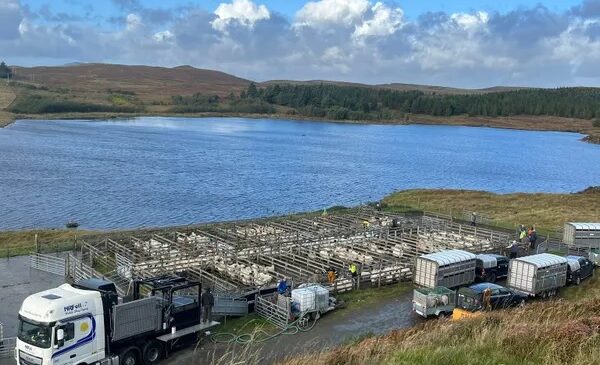
Environmental and animal welfare considerations of dealing with sheep scab
This podcast focuses on how farmers can manage sheep scab. In particular discussing what farmers need to be aware of and the rules and regulations that need to be followed when managing sheep dip from animal welfare, to environmental regulation. Photo credit: ©Neil Fell

